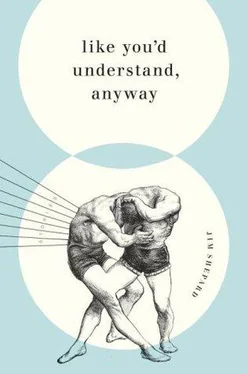Another frost this morning. In our window box, frozen daisies.
The executioner has the uncontested title to all clothing and jewelry found on the men and women put to death. He pays no taxes. The condemned are subcontracted to him by the nation. The trade in cadavers with the medical profession brings in some additional revenue. But in terms of expenses there's all household costs plus salaries and repairs to the carriages and feed for the horses and any number of other constant vexations. And of course the expectation that the machine will be maintained and housed. My father wore on execution days a brocaded red singlet with the gallows embroidered across his chest in black and gold thread. In bright sun onlookers could make out a heavily worked panel of darker red satin along his spine. His culottes were of the finest silk. What do I own? A coat of black cloth, a satin waistcoat from an old-clothes shop, a pair of black breeches, a pair of serge breeches, two clothes brushes, four shirts, four cravats, four handkerchiefs. Two pairs of stockings, two pairs of shoes, and a hat.
This morning in the courtyard, Anne-Marie was doing no work at all. The sun was out but it was very cold. Clouds issued from the mouth of our sleeping neighbor in his iron chair. She sat with her back to the plaster, wrapping and rewrapping a shawl. I tucked it behind her and she thanked me. We sat for half an hour. Sometimes when addressed she seemed as if she were alone. I told her that I had stopped for wine on the way home the previous evening, and had overindulged. She responded that it was probably a part of my unconquerable rejection of anything that might cause me to think. And what was it I should be thinking about? I wanted to know. The world and my place in it, she said. And what was my place in it? I asked, and touched her cheek. She stood, composing her carriage. Around me now she carries herself like the Holy Sacrament. She returned to the house. We've had two weeks of her working in silence, the Austere Isolate, while the rest of us come and go, playing off one another like members of a mournful choral trio.
Perhaps, I told her at dinner, my curse from God was that I lacked that stone tabernacle within the soul in which I could treasure absolute truths. We were having soup, skate, and artichokes. She answered, after some thought, that I was killing her, but that I was also teaching her how to die.
We kept to ourselves the rest of the evening. At one point we had to consult over the household's ledger books.
Ask any soldier what his profession entails. He'll answer that he kills men. No one flees his company for that reason. No one refuses to eat with him. And whom does he kill? Innocent people who are only serving their country.
Together Anne-Marie and I have negotiated, like wood chips in a waterfall, the Revolution itself, with its shocks and transformations; the trial and condemnation of the King; his execution; and all the deprivations of the war with the allied powers. We covered our heads and hurried past each disaster, sometimes speaking of it afterward, sometimes not. The poor King's troubles began when he was dragged into the unhappy affair with America. Advantage was taken of his youth. In financing his support of America's revolution, he fell victim to that belief of monarchs that expenditure should not be governed by revenue, but revenue instead by expenditure. Then nature provided its additional burden: the summer of 1788 and its unprecedented drought. We saw starvation in our own neighborhood. Suddenly everyone was busy holding forth on the subject of just which radical changes needed to be made, each to his own attentive audience.
So events took their course, thanks to that crowd of minor clerks and lawyers and unknown writers who went about rabble-rousing in clubs and cafés. From such crumbling mortar was the Edifice of Freedom built. After the Bastille's fall de Launay was decapitated by a pocketknife used to saw through his neck.
Foulon, accused of plotting the famine, had the mouth of his severed head stuffed with grass. It was proclaimed that the great skittle row of privilege and royalism had been struck to maximum effect, revealing a newly cleared space for civic responsibility. The treasury was refilling, the corn mills turning, the traitors in full flight, the priests trampled, the aristocracy extinct, the patriots triumphant. The King did nothing, apparently believing the more extreme sentiments to be a fever that had to run its course.
Anne-Marie took up needlework, then abandoned it as unsatisfying.
The National Assembly had announced only the abolition of royalty. Everyone saw clearly what needed to be razed or pillaged, but no one agreed on what to erect in its place. Not a man near the wheels of power was equal to the task at hand, with ever greater tasks impending. The more radical, sensing conspiracies, wanted evermore surveillance, evermore wide-ranging arrests, evermore extremity. The maintenance of civic virtue, they insisted, was impossible without bloodshed. They learned the hard way that government was impossible if the bloodshed was not monopolized and managed.
First the King's Swiss Guards were slaughtered defending him at the Hôtel de Ville. Some were thrown living into a bonfire. Others from windows onto a forest of pikes. My assistant Legros, passing the Tuileries, saw furniture together with corpses being pitched from the upper stories into the courtyard. He met us on our way home, and Anne-Marie and I had to wait at each city gate so he could shout “Vive la nation!” like a good sansculotte, thereby diffusing the murderousness of those roaming the streets around us. Four times we were stopped and made to swear an oath to the new regime. At the entrance to our courtyard we found half a corpse, which I dragged out of the archway by the feet.
Then in September it was deemed necessary to weed out royalist sympathizers after the Prussians had enjoyed some success against our armies, and people's tribunals, set up in each of the prisons, began handing prisoners over to crowds gathered outside with butchers' implements and bludgeons. In four days thirteen hundred — one half of all the prisoners in Paris — were massacred, including the Mme de Lamballe, whose body was dragged behind a wagon by two cords tied to her feet while her head was carried on a pike to where the royal family was imprisoned, so that it might be made to bow to the Queen. One of the killers was said to have used a carpenter's saw. Each neighborhood seemed to have its own mob of National Guards and sansculottes, a few of them mounted, on their horses bearing fishwives and bacchantes, filthy and bloody and drunken, their clothes all at sea. At the Quai d'Or-say hung a whole row of men mangled and lanterned, their feet continually set in motion by people brushing past. Garden terraces were ashine each morning with smashed bottles in the sunlight. It was said that Mme de Lamballe's head was found wedged upside down on a cabaret bar and surrounded by glasses, as if serving as a carafe. She'd been famous for her fragile nerves and her penchant for fainting at the slightest unpleasantness.
As was the King. We followed his trial through the newspapers and broadsheets. Talking with Henri-François, our eldest, was like conversing with a rock garden, so Anne-Marie was left with me. During meals we were circumspect because Legros shared our table, but at night in bed some of our old intimacy returned. She argued the King's side: perhaps the mildest monarch to ever fill the throne had been precipitated from it because of his refusal to adopt the harshness of his predecessors. Throughout the proceedings the Jacobins — men and women alike — ate ices and bawled from the galleries for the death penalty. Legendre proposed to divide the accused into as many pieces as there were departments, so as to mail a bit of him to each. My wife was at a loss, reading such news: where did such ferocity originate? I had no answer for her. Just as the King had no ally in the Assembly willing to risk his own life on his sovereign's behalf. Having refused to become the patron of any one side, our helpless monarch had become the object of hatred for all.
Читать дальше












